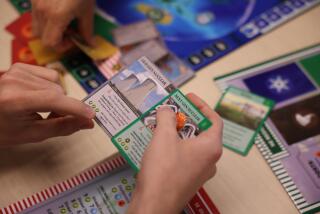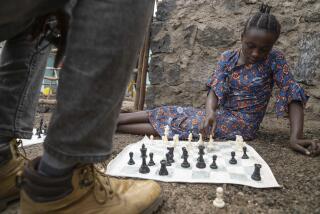She Plays Her Game With World Leaders : Nightmare Makes Girl Peace Advocate
- Share via
FRESNO — One night three years ago, Michelle Alexander ran into her parents’ bedroom crying from a terrible nightmare about living in a world devastated by nuclear war.
That nightmare inspired Michelle’s invention of a board game called “Give Peace a Chance,” which educates children about global relations.
Since then, she’s played her game with former Soviet Foreign Minister Andrei A. Gromyko, Chinese Vice President Ulanhu and India Premier Rajiv Gandhi. Next month she will play the game with U.N. Secretary General Javier Perez de Cuellar.
“Almost all children have a hobby and do something that they really want. I really want world peace. It’s a hobby of mine,” Michelle said.
‘We Want to Grow Up’
“Older people can learn things from children. That’s what we’re trying to tell them--we want to grow up and we want to live,” she added in an interview.
Michelle, now 11, developed the peace game as a third-grade class project in which students were asked to invent something for the future.
Her game, similar to Monopoly, has players using small markers with a nation’s flag. Winners create nuclear free zones, share scientific secrets and invite children’s peace delegations to their countries.
Losers invade smaller countries or refuse to negotiate treaties.
Michelle’s game includes a version of the “Go Directly To Jail” card, but with an apocalyptic twist: the card reads, “Nuclear warfare between countries. Game is over for all countries.”
First Prize Won
The game won first place in the 1985 International Children’s Peace Prize competition. Michelle later was selected for a world tour with a children’s peace delegation and traveled to London, Norway, Denmark, the Soviet Union, India, Thailand, Hong Kong and Japan.
Even though Michelle invented the game, she fared poorly when pitted against the likes of Gromyko and Gandhi.
“I always lost,” she said plainly.
Such modesty is par for the course, Michelle’s teacher and principal observed.
“As far as I’m concerned, she hasn’t changed one bit. She’s still a little girl,” said Manchester Elementary Principal Gary Christensen.
Bob Jost, Michelle’s sixth grade teacher, said he’s tapped Michelle’s “wealth of experience” during lessons.
Wise Beyond Years
“I’ve been using her as an unobtrusive resource all year,” Jost chuckled, and added, “She’s wise beyond her years and says things from time to time that reflect her experiences.”
Michelle’s 1987 meeting with India’s Gandhi illustrates the breadth of the young girl’s travels.
The children’s peace delegation, searched several times before being allowed into a room to meet with Gandhi, first sang a song to greet the leader. Michelle recalled how a girl from Norway then told him how they had toured New Delhi by bus that morning and saw other children in the streets, their arms outstretched, begging for food.
The girl asked Gandhi how he could allow his country to spend so much money building nuclear weapons while children begged for food in the streets.
Michelle recalled, “He (Gandhi) said, ‘We’re doing everything we can.’ And then everybody was crying. There wasn’t a dry eye in the room.”
More to Read
The biggest entertainment stories
Get our big stories about Hollywood, film, television, music, arts, culture and more right in your inbox as soon as they publish.
You may occasionally receive promotional content from the Los Angeles Times.










